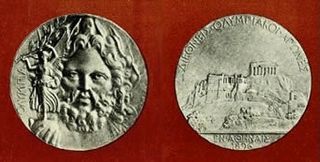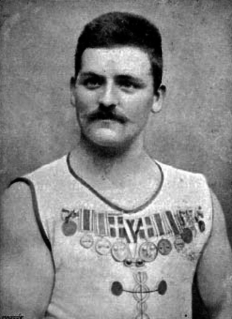
The 1896 Summer Olympics, officially known as the Games of the I Olympiad and commonly known as Athens 1896, was the first international Olympic Games held in modern history. Organised by the International Olympic Committee (IOC), which had been created by French aristocrat Pierre de Coubertin, it was held in Athens, Greece, from 6 to 15 April 1896.

At the 1896 Summer Olympics, one wrestling event was contested. It was organized and prepared by the Sub-Committee for Wrestling and Gymnastics. Five competitors from four nations competed.
At the 1896 Summer Olympics, two tennis events were contested, both for men. They began on 8 April and continued on 9 April, 10 April, and 11 April. 13 or 15 competitors from six nations, including seven Greeks, took part in the tennis competition. Many of the doubles teams were of mixed nationality, including all three medalist pairs. None of the leading players of the time such as Wimbledon champion Harold Mahony, U.S champion Robert Wrenn, William Larned or Wilfred Baddeley participated. To strengthen the field, the organization added sportsmen from other Olympic events, including weightlifter Momčilo Tapavica, hammer thrower George S. Robertson and 800-metres runners Edwin Flack and Friedrich Traun.
At the 1896 Summer Olympics, four swimming events were contested, all for men. They were planned and organized by the Sub-Committee for Nautical Sports. All events took place on 11 April in the Bay of Zea. There was a total of 13 participants from 4 countries competing.

At the 1896 Summer Olympics, five sport shooting events were contested. These events took place at the newly constructed shooting range at Kallithea. They were organized and prepared by the Sub-Committee for Shooting. Sixty-one shooters from seven nations competed.

At the 1896 Summer Olympics, eight gymnastics events, all for men, were contested in Panathinaiko Stadium. They were organized and prepared by the Sub-Committee for Wrestling and Gymnastics. Events took place on April 9, April 10, and April 11, 1896. There were 71 competitors from 9 nations that took part in gymnastics.

At the 1896 Summer Olympics, three fencing events were contested at the Zappeion. They were prepared and organized by the Sub-Committee for Fencing. The épée event for men was cancelled. All fencing was done to three touches. Events were held on 7 April and 9 April 1896. 15 athletes from four nations competed; 8 fencers from 3 nations won one medal each.

At the 1896 Summer Olympics, six cycling events were contested at the Neo Phaliron Velodrome. They were organized and prepared by the Sub-Committee for Cycling. Events were held on 8 April, 11 April, 12 April and 13 April 1896. Nineteen cyclists, all men, from five nations competed.

At the 1896 Summer Olympics, the first modern Olympiad, twelve athletics events were contested. A total of 25 medals were awarded. The medals were later denoted as 37 modern medals. All of the events except the marathon were held in the Panathinaiko Stadium, which was also the finish for the marathon. Events were held on 6 April, 7 April, 9 April, and 10 April 1896. Altogether, 63 athletes, all men, from nine nations competed. This made athletics the most international of the nine sports at the 1896 Games.

The 2004 Summer Olympics, officially known as the Games of the XXVIII Olympiad, were a summer multi-sport event held in Athens, the capital city of Greece, from 13 to 29 August 2004. A total of 10,625 athletes from 201 countries represented by National Olympic Committees participated in these games, competing in 301 events in 28 sports. Kiribati and Timor Leste competed for the first time in these Olympic Games.

The 1896 Summer Olympics, officially known as the Games of the I Olympiad, were a summer multi-sport event held in Athens, the capital of Greece, from 6 to 15 April 1896, and were the first Olympic Games of the Modern era.

Sotirios Versis was a Greek athlete and weightlifter. He competed at the 1896 Summer Olympics in Athens and the 1900 Summer Olympics held in Paris.

Germany competed at the 1896 Summer Olympics in Athens, Greece. The Germans were the third most successful nation in terms of both gold medals and total medals (13). Gymnastics was the sport in which Germany excelled. The German team had 19 athletes. The Germans had 75 entries in 26 events, taking 13 medals.

Greece was the host nation of the 1896 Summer Olympics held in Athens. The number of Greek contestants is commonly cited as 169, but as many as 176 Greeks contested events in all nine sports. The Greeks were by far the most successful nation in terms of total medals with 47, 27 more than the United States of America. Nevertheless, their number of first-place finishes (10) was one fewer than the Americans' 11. The Greeks had 172 entries in 39 events. Only 4 events had no Greek entrants—the 400 metres and the high jump in athletics and the vault and the team horizontal bar in gymnastics.

Weightlifting has been contested at every Summer Olympic Games since the 1920 Summer Olympics, as well as twice before then. It debuted at the 1896 Summer Olympics, in Athens, Greece, and was also an event at the 1904 Games.

Sierra Leone sent a delegation to compete at the 2000 Summer Olympics in Sydney, Australia from 15 September to 1 October 2000. This was the African nation's sixth time appearing at a Summer Olympic Games. The delegation consisted of three competitors, two track and field athletes; Alpha B. Kamara and Ekundayo Williams; and weightlifter Joseph Bellon. Neither of the track athletes advanced beyond the first round of their events, while Bellon finished 16th in the men's under 77 kg event.

Greece has a long presence at the Olympic Games, as they have competed at every Summer Olympic Games, one of only five countries to have done so, and most of the Winter Olympic Games. Greece has hosted the Games twice, both in Athens. As the home of the Ancient Olympic Games it was a natural choice as host nation for the revival of the modern Olympic Games in 1896, while Greece has also hosted the 2004 Summer Olympics. During the parade of nations at the opening ceremony of the Olympic Games, Greece always enters the stadium first and leads the parade to honor its status as the birthplace of the Olympics, with the notable exception of 2004 when Greece entered last as the host nation. Before the Games the Olympic Flame is lit in Olympia, the site of the Ancient Olympic Games, in a ceremony that reflects ancient Greek rituals and initiates the Olympic torch relay. The flag of Greece is always hoisted in the closing ceremony, along with the flags of the current and the next host country.

Denmark first participated at the Olympic Games at the inaugural 1896 Games, and has sent athletes to compete in every Summer Olympic Games since then, except for the sparsely attended 1904 Games. Denmark has also participated in the Winter Olympic Games several times since 1948, including every Games since 1988.

The men's one hand lift, an event similar to the modern snatch, was one of two weightlifting events in the weightlifting at the 1896 Summer Olympics programme.

The men's two hand lift was one of two weightlifting events held as part of the Weightlifting at the 1896 Summer Olympics program. The two-handed lift was the first weightlifting event on 7 April. Six athletes took part. Viggo Jensen of Denmark and Launceston Elliot of the United Kingdom both lifted 111.5 kilograms, and the tie was broken by a determination by Prince George that Jensen had performed the lift with better form than had Elliot. A protest by the British delegation resulted in each athlete being given further attempts to improve their scores. Neither did, and the results stood as originally declared with Jensen taking the gold medal. Jensen had, however, suffered from the extra lifts in that he experienced a slight injury in trying to lift more than he was able.



















